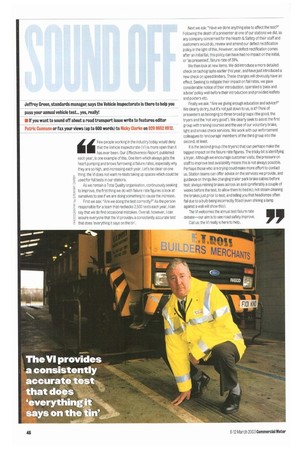Jeffrey Green, standards manager, says the Vehicle Inspectorate is there to help you pass your annual vehicle test.. yes, really!
Page 46

If you've noticed an error in this article please click here to report it so we can fix it.
• if you want to sound off about a road transport Issue write to features editor Patric Cunnane or fax your views (up to 600 words) to Nicky Clarke on 020 8652 8912.
66 Few people working in the industry today would deny
that the Vehicle Inspectorate (VI) is more open than it has ever been. Our Effectiveness Report, published each year, is one example of this. One item which always gets the heart pumping and brows furrowing is failure rates, especially why they are so high, and increasing each year. Let's be clear on one , thing: the VI does not want re-tests taking up spaces which could be cr used for full tests in our stations. 0
— As we remain a Total Quality organisation. continuously seeking to improve, the first thing we do with failure rate figures is look at ourselves to see if we are doing something to cause the increase. First we ask: "Are we doing the test correctly?" As the person kresponsible for a team that rechecks 2,500 tests each year, I can 5 say that we do find occasional mistakes. Overall, however, I can o
!,5 assure everyone that the VI provides a consistently accurate test
Ithat does 'everything it says on the tin'.
Next we ask: "Have we done anything else to affect the test?" Following the death of a presenter at one of our stations we did, as any company concerned for the Health & Safety of their staff and customers would do, review and amend our defect rectification policy in the light of this. However, as defect rectification comes after an initial fail, this policy can have had no impact on the initial, or 'as presented', failure rate of 39%.
We then look at new items. We did introduce a more detailed check on tachographs earlier this year, and have just introduced a new check on speed limiters. These changes will obviously have an effect. Seeking to mitigate their impact on fail rates, we gave considerable notice of their introduction, operated a 'pass and advise' policy well before their introduction and provided leaflets and posters etc.
Finally we ask: "Are we giving enough education and advice?" We clearly do try, but it's not just down to us, is it? Think of presenters as belonging to three broad groups (the good, the tryers and the `not very good'). We clearly seek to assist the first group with training courses and the use of our voluntary brake, light and smoke check services. We work with our enforcement colleagues to 'encourage' members of the third group into the second, at least.
It is the second group {the tryers) that can perhaps make the biggest impact on the failure rate figures. The tricky bit is identifying a tryer. Although we encourage customer visits, the pressure on staff to improve test availability means this is not always possible. Perhaps those who are trying could make more effort to contact us. Station teams can offer advice on the services we provide, and guidance on things like changing trailer park brake cables before test: always relining brakes across an axle (preferably a couple of weeks before the test, to allow them to bed in); not steam cleaning the brakes just prior to test; and telling you that headlamps often fail due to a bulb being incorrectly fitted (even shining a lamp against a wall will show this).
The VI welcomes the annual test failure rate debate—our aim is to see road safety improve. Call us; the VI really is here to help.




































































































































































